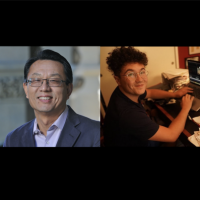SystemX Affiliates: login to view related content.

View the Brain Bridges documentary here: https://www.youtube.com/watch?v=OzHcV6wPFso
The flow of professional talent, both permanent and temporary, is a prevalent aspect of globalization. High-skilled talent moves across national borders in search of better academic, professional, and social opportunities. But the concept of talent flow is not narrowly confined to the physical relocation of talented individuals. In the era of the knowledge economy, mobile talent contributes to the creation and diffusion of knowledge, and one cannot disregard the social capital value of talent that incorporates the connections between cultures and the potential for transnational collaboration.
The migration of high-skilled professionals is not a zero-sum game in which the host country receives a net inflow of human capital from the home country. A phenomenon commonly referred to as “brain drain” for the home country and “brain gain” for the host country can in fact offer opportunities for brain circulation or brain linkage—that is, home-host interactions that create a win-win, positive-sum situation for both sides. When high-skilled migrant talent stays engaged with the home country, both home and host countries gain from the productive capacity embodied in the ties and networks linking many individuals and organization.
Transnational social capital and ties spanning geographic and cultural distance remain vital to today’s global market economy, even more so in a time of political tensions at home and abroad. Speakers Gi-Wook Shin and Dexter Simpson will discuss the positive gains of global talent flows and how migrant talent can create mutually beneficial ties—or “brain linkages”—between the United States and their home countries, even during the times of heightened political tension and rising anti-immigrant sentiment in the United States.
Gi-Wook Shin is the director of the Walter H. Shorenstein Asia-Pacific Research Center; the William J. Perry Professor of Contemporary Korea; the founding director of the Korea Program; a senior fellow of the Freeman Spogli Institute for International Studies; and a professor of sociology, all at Stanford University. His research concentrates on social movements, nationalism, development, and international relations, with focus on Korea and broader Asia. Shin is the author/editor of over twenty books and numerous articles, including Global Talent: Skilled Labor as Social Capital in Korea; One Alliance, Two Lenses: U.S.-Korea Relations in a New Era, and Ethnic Nationalism in Korea. He’s currently working on a book on Global Talent Flows, in which he examines the growing importance of transnational human and social capital and assesses the strategies and policies of talent development and recruitment in the Asia-Pacific region. Before coming to Stanford, Shin taught at the University of Iowa and the University of California, Los Angeles. He holds BA from Yonsei University in Korea and MA and PhD from the University of Washington.
Dexter Simpson is an Englishman in New York. Aside from his love for Sting and cultural references, he a Brit-turned-Californian Stanford film student now working at a documentary production house in Brooklyn on shows for HBO and Netflix etc. His fascination with human-narrative oriented research and passion for filmmaking brought him to work for APARC and Professor Gi-Wook Shin, where together, they produced a short documentary film about brain linkages and talent migration, entitled Brain Bridges. Dexter is a music nerd and dog-mad, and hopes to continue producing documentary content that centers on humans, stories and systems.


